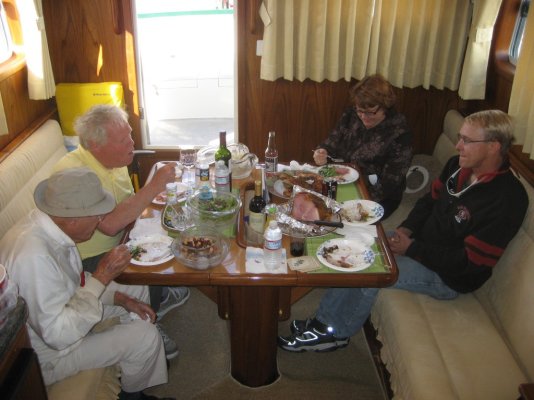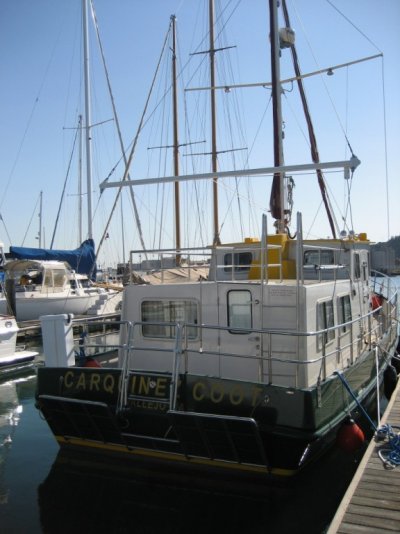I'm a newbie, but have been lurking for a while now. The amount I've learned from all of you is invaluable. And, for that I thank you ahead of time.
*
Here's my situation - My wife and I have always been boaters, but primarily on lakes, and me sailing in San Francisco bay. We've decided it's time for a real boat and after much, much research have decided the way to go is a trawler as we won't be in any hurry and they tend to have everything we want. Need to slow down and see the sights in style!
*
In order to get her even more excited about this new adventure, I asked what features she would like and she told me that she would like a pilothouse with full walk-arounds (preferably covered) and less than 15 years old (she originally said 10 but I talked her into 15 to help keep the price down). Of course, I say "no problem" (in this market I figured I could find many boats to choose from). Wrong! The only boat in the bay area (other than 60+ footers) that meets these requirements is a 2001 Offshore 48', which has twin Cummins' 450C's, and of which we were almost ready to pull the trigger on.
*
I realize that this isn't a trawler, but thought I could just drive it slow and be as happy as we would be in a real trawler (and, if I ever needed the extra power, it's available). However, last night a friend of mine mentioned that I wouldn't be able to drive slow for very long stretches without damaging the engines (of course, the broker today told me that it wouldn't be a problem). This would be a deal killer.
*
So I have several questions and already know that they can't be answered precisely without more information (which I don't have yet), but any general opinions or general thoughts would be very, very appreciated and helpful! Again, thanks in advance!
1. Is this true and something to worry about?
2. If so, could I drive it slow for periods of times and then speed up other times to compensate?
3. If so, any guesstimate as to what percentage of each?
4. My friend also thought that the recommended RPM's were probably 75% of max (I looked online and haven't found anything yet) . Do you agree or have other thoughts or opinions?
By the way, I've also looked in the PNW and the entire west coast (on Yachtworld), but the only boats that meet the boss's requirements seem to be the Selene's, which are a bit pricey for me.
*
*
*
*
*
-- Edited by Nsail on Friday 2nd of March 2012 08:45:20 PM
-- Edited by Nsail on Friday 2nd of March 2012 08:45:41 PM
*MOD* Edited for font size. We're a bunch of old guys with bad eyes. Thanks.
-- Edited by GonzoF1 on Friday 2nd of March 2012 09:38:34 PM
-- Edited by Nsail on Saturday 3rd of March 2012 09:42:58 AM
*
Here's my situation - My wife and I have always been boaters, but primarily on lakes, and me sailing in San Francisco bay. We've decided it's time for a real boat and after much, much research have decided the way to go is a trawler as we won't be in any hurry and they tend to have everything we want. Need to slow down and see the sights in style!
*
In order to get her even more excited about this new adventure, I asked what features she would like and she told me that she would like a pilothouse with full walk-arounds (preferably covered) and less than 15 years old (she originally said 10 but I talked her into 15 to help keep the price down). Of course, I say "no problem" (in this market I figured I could find many boats to choose from). Wrong! The only boat in the bay area (other than 60+ footers) that meets these requirements is a 2001 Offshore 48', which has twin Cummins' 450C's, and of which we were almost ready to pull the trigger on.
*
I realize that this isn't a trawler, but thought I could just drive it slow and be as happy as we would be in a real trawler (and, if I ever needed the extra power, it's available). However, last night a friend of mine mentioned that I wouldn't be able to drive slow for very long stretches without damaging the engines (of course, the broker today told me that it wouldn't be a problem). This would be a deal killer.
*
So I have several questions and already know that they can't be answered precisely without more information (which I don't have yet), but any general opinions or general thoughts would be very, very appreciated and helpful! Again, thanks in advance!
1. Is this true and something to worry about?
2. If so, could I drive it slow for periods of times and then speed up other times to compensate?
3. If so, any guesstimate as to what percentage of each?
4. My friend also thought that the recommended RPM's were probably 75% of max (I looked online and haven't found anything yet) . Do you agree or have other thoughts or opinions?
By the way, I've also looked in the PNW and the entire west coast (on Yachtworld), but the only boats that meet the boss's requirements seem to be the Selene's, which are a bit pricey for me.
*
*
*
*
*
-- Edited by Nsail on Friday 2nd of March 2012 08:45:20 PM
-- Edited by Nsail on Friday 2nd of March 2012 08:45:41 PM
*MOD* Edited for font size. We're a bunch of old guys with bad eyes. Thanks.
-- Edited by GonzoF1 on Friday 2nd of March 2012 09:38:34 PM
-- Edited by Nsail on Saturday 3rd of March 2012 09:42:58 AM


